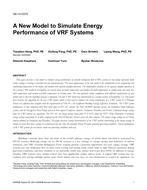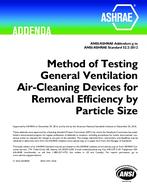The objective of 1194-RP was to develop computationally efficient, fully validated, and well-documented transient models for cooling coils. First, assumptions that simplify the modeling were evaluated using a detailed model for a counter-flow heat exchanger with a simplified geometry. It was found that transients associated with water condensate on the coil outer surface can be neglected and a Lewis number of unity is valid under dehumidifying conditions. A lumped fin efficiency approach is applicable to transient coil analysis. However, a modified fin efficiency for sensible heat transfer was derived for wet conditions. More simplified models were then developed for realistic heat exchanger geometries, which involve solving transient energy balances with a given coil physical description. The impact of numerical solution techniques was investigated, and a simplified model was identified that represents a good compromise between accuracy and computational requirements. A thorough experimental validation was performed using data obtained from two different coils tested in the laboratory. The model was compared with existing simplified models available in the literature and confirmed to provide improved predictions of cooling coil transient performance. Finally, a simpler inverse model was developed on the basis of the forward model and a two-step approach for parameter estimation was presented. Both models were coded in C++ and implemented as a DLL file that can be called in MatLab. The transient models developed in this project are useful for testing feedback controllers and fault detection and diagnostic methods.
Product Details
- Published:
- 2006
- File Size:
- 1 file , 2.6 MB
- Product Code(s):
- D-27841


